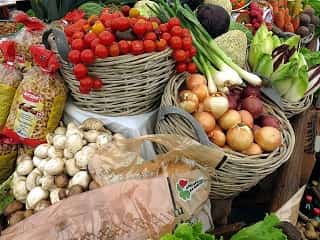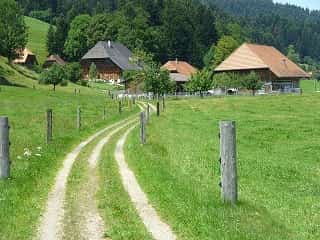Jobs and salaries on farms and in agriculture sector in Switzerland
Switzerland's agricultural sector is a vital component of its economy, providing employment opportunities and contributing to the country's food security. Jobs on farms and in agriculture encompass a range of roles, from crop cultivation and animal husbandry to food processing and distribution. Despite the sector's importance, it faces various challenges such as labor shortages, climate change, and competition from imported goods. However, advances in technology and increasing consumer demand for locally sourced products have created new opportunities for growth and innovation in Swiss agriculture. In this article, we will explore the current state of jobs on farms and in agriculture in Switzerland, including the types of roles available, the challenges facing the sector, and the potential for future development.
Types of farm jobs available in Switzerland
Switzerland's agriculture industry offers a wide range of job opportunities for those interested in pursuing a career in farming. There are several types of farm jobs available in Switzerland, including crop production, livestock production, forestry, and fisheries.
Crop production jobs involve cultivating and harvesting crops such as fruits, vegetables, and grains. Common crop production jobs in Switzerland include farm managers, crop farmers, and greenhouse operators. Crop farmers typically work on farms, while greenhouse operators grow crops in controlled environments like greenhouses.

Livestock production jobs involve raising and caring for animals, including cattle, pigs, and poultry. Common livestock production jobs in Switzerland include livestock farmers, ranchers, and animal husbandry technicians. Animal husbandry technicians work closely with farmers to provide care for livestock and ensure their health and welfare.
Read more: Shepherds in Switzerland - job requirements, pay, benefits, comparisons and more.
Forestry jobs involve managing and maintaining forests, including planting and harvesting trees, and managing wildlife. Common forestry jobs in Switzerland include forest rangers, wildlife managers, and timber harvesters.
Read more: Foresters in Switzerland - job requirements, pay, comparisons and more.
Fisheries jobs involve the cultivation and harvesting of fish and other aquatic species. Common fisheries jobs in Switzerland include fish farmers, aquaculture technicians, and fisheries managers.
Read more: Fisherman in Switzerland - job requirements, pay, working conditions and more.
Each type of farm job requires different skills and qualifications. For example, crop farmers may need to be knowledgeable about planting and harvesting techniques, while livestock farmers may need experience in animal husbandry and nutrition. Forestry workers may need to have a background in environmental science or natural resource management, while fisheries workers may need experience in marine biology or aquaculture.
The average salary for farm jobs in Switzerland varies depending on the type of job and the experience of the worker. According to data from the Federal Statistical Office, the median salary for agriculture and forestry workers in Switzerland is around CHF 55,000 per year.
In summary, the agriculture industry in Switzerland offers a diverse range of job opportunities for those interested in pursuing a career in farming. Whether you are interested in crop production, livestock production, forestry, or fisheries, there are a variety of jobs available that can offer a rewarding career path.
Read more: 100 Jobs and careers in farming and agriculture industry
Salaries
Salaries in the agriculture sector in Switzerland can be highly competitive, but they vary greatly depending on a number of factors. The range of salaries for different roles and jobs in this sector is quite large, and there are several factors that can impact how much you can expect to earn.
One of the biggest factors that influences salaries in this field is location. Agricultural jobs in more remote or rural areas may pay less than those in more urban or populated areas. Similarly, the size and type of the employer can also make a significant difference in salary. Large agricultural companies may offer higher salaries than smaller farms or cooperatives.
Additionally, salaries in this field can also be affected by overtime and the specific skills required for the job. Many agricultural jobs involve long hours and physically demanding work, and those who are willing to work overtime or have specialized skills can often command higher salaries.
Despite these differences, salaries in the agriculture sector in Switzerland are generally quite competitive when compared to jobs with similar requirements. Employers often offer a range of benefits and perks to attract and retain workers, including health insurance, paid time off, and retirement plans.
Here you will find salaries for selected farm and agriculture jobs:
- Farm worker
- Gardener
- Veterinarian
Overall, if you are considering a career in the agriculture sector in Switzerland, it's important to keep in mind that salaries can vary widely based on a number of different factors. While some roles may offer higher salaries than others, it's important to weigh the other benefits and opportunities available to you as well.
Educational Requirements for Farm Jobs in Switzerland
Switzerland is known for its highly efficient and innovative agricultural industry, which relies heavily on a skilled workforce. The educational and certification requirements for different farm jobs in Switzerland vary based on the job type and level of responsibility.
Educational Requirements for Farm Jobs in Switzerland for most entry-level farm jobs in Switzerland, a high school diploma or its equivalent is required. However, certain positions may require additional education such as an associate's or bachelor's degree in agriculture or a related field.
For higher-level farm jobs such as farm managers, agricultural engineers, and researchers, a master's degree or Ph.D. in agricultural science, agricultural engineering, or a related field may be necessary. These positions require a higher level of knowledge, experience, and critical thinking skills.
If a candidate is from abroad and interested in pursuing a farm job in Switzerland, they may need to meet additional requirements in order to work legally in the country.

For example, individuals who are not citizens of the European Union (EU) or the European Free Trade Association (EFTA) may need to obtain a work visa or residence permit to work in Switzerland. They may also need to demonstrate proficiency in the local language, which is usually German, French, or Italian, depending on the region where they intend to work.
Additionally, some farm jobs in Switzerland may require specialized knowledge or skills that are not easily obtainable in the country, such as experience with certain crops or livestock breeds. In these cases, the employer may be willing to sponsor the foreign worker for a work visa or help them obtain the necessary certification or training to meet the requirements of the job.
It is important for foreign candidates interested in pursuing a farm job in Switzerland to research the specific requirements for their job type and seek guidance from the Swiss embassy or consulate in their home country. They can also network with Swiss agricultural organizations or use online job search websites to explore available opportunities and connect with potential employers.
Tips if you are job seeker from abroad
If you are a job seeker from abroad looking to work in the farm and agriculture industry in Switzerland, there are several tips you should keep in mind:
1. Research visa requirements: Before starting your job search, research the visa requirements for working in Switzerland as a foreigner. Depending on your nationality, you may need to obtain a work permit or a visa. It's important to understand the requirements and application process to avoid any delays or complications.
2. Highlight your language skills: Switzerland has four official languages, including German, French, Italian, and Romansh. Depending on the region and the job, fluency in one or more of these languages may be required. Make sure to highlight your language skills in your application, including your proficiency level and any relevant certifications.
3. Focus on transferable skills: Even if you don't have specific experience in the agriculture industry, you may have transferable skills that are relevant to farm jobs in Switzerland. For example, skills in project management, logistics, or customer service can be valuable in agriculture-related roles. Make sure to highlight these skills in your application.
4. Use job search websites: There are several job search websites that cater specifically to the Swiss job market, including jobs.ch, jobup.ch, and indeed.ch. Use these websites to search for relevant job postings and to submit your application.
5. Consider working with a recruitment agency: Recruitment agencies can be a valuable resource for job seekers from abroad. They can help match you with relevant job openings and provide support throughout the application and interview process. Make sure to research reputable agencies that specialize in the agriculture industry.
By following these tips, job seekers from abroad can increase their chances of finding and securing desirable farm and agriculture jobs in Switzerland. It's important to be proactive, persistent, and adaptable to the requirements of the Swiss job market. With dedication and effort, it's possible to build a successful career in this important and growing industry.
How to find suitable job opportunities
The Swiss job market for farms and agriculture is dynamic and constantly evolving. There are several job search websites, recruitment agencies, and networking opportunities that individuals can explore to find suitable job opportunities in the industry.
Job Search Websites: One of the most effective ways to find farm and agriculture jobs in Switzerland is through job search websites. There are several websites dedicated to listing available jobs in this field, including Agronomis, JobScout24, and Farming Jobs Switzerland. These websites allow job seekers to search for jobs based on location, job type, and experience level. Additionally, they provide a platform for employers to post job openings and connect with potential candidates.
Recruitment Agencies: Recruitment agencies can also be a useful resource for individuals looking for farm and agriculture jobs in Switzerland. These agencies work with employers to fill job openings and connect them with suitable candidates. Some of the popular recruitment agencies in Switzerland for agriculture jobs include Agri People, Agri Job Switzerland, and Farmerline. Individuals can register with these agencies and get updates on the latest job openings that match their skills and experience.
Networking Opportunities: Networking can also play a significant role in finding farm and agriculture jobs in Switzerland. Attending industry events, conferences, and trade shows can provide opportunities to meet and connect with potential employers and colleagues in the industry. Some of the popular industry events in Switzerland include Swiss Agriculture Fair, Agrovet-Strickhof Open Day, and the Swiss Alpine Farmers Association Congress.